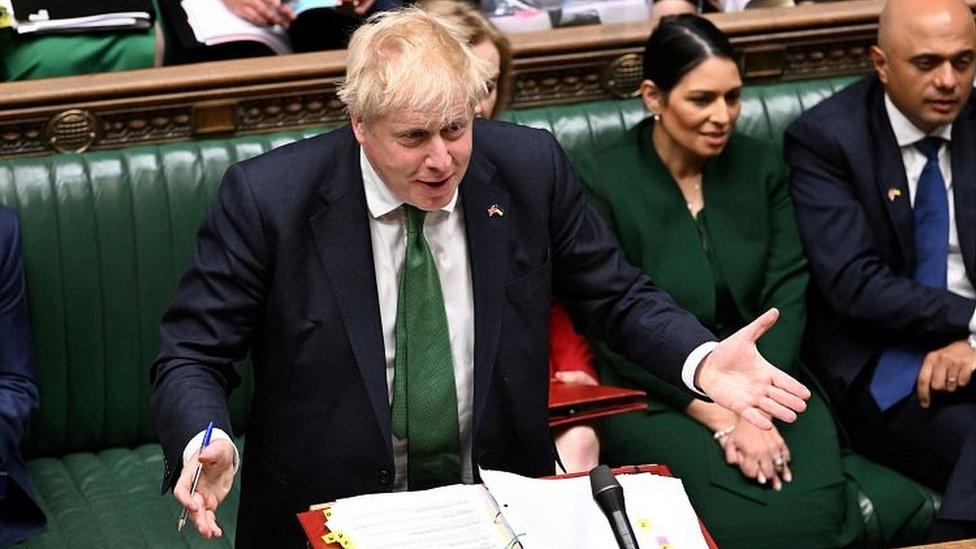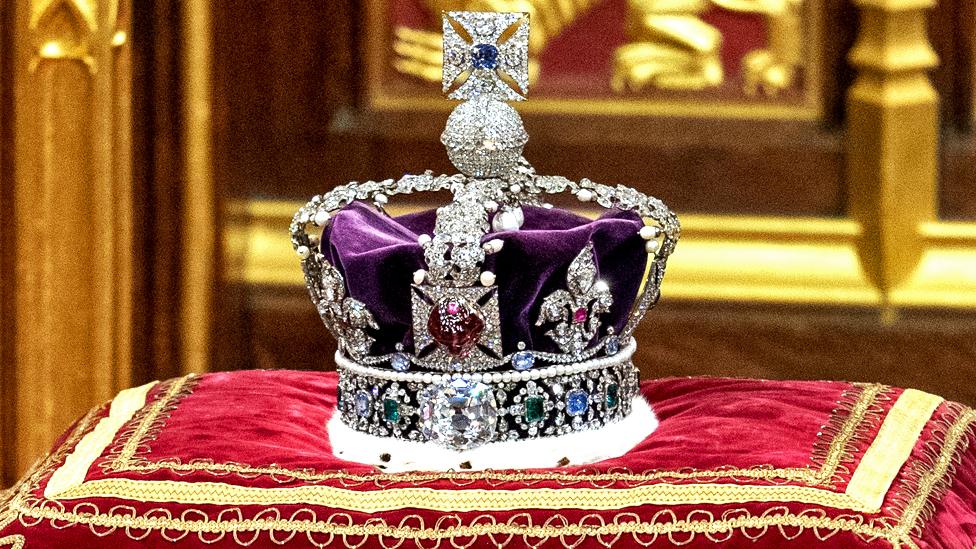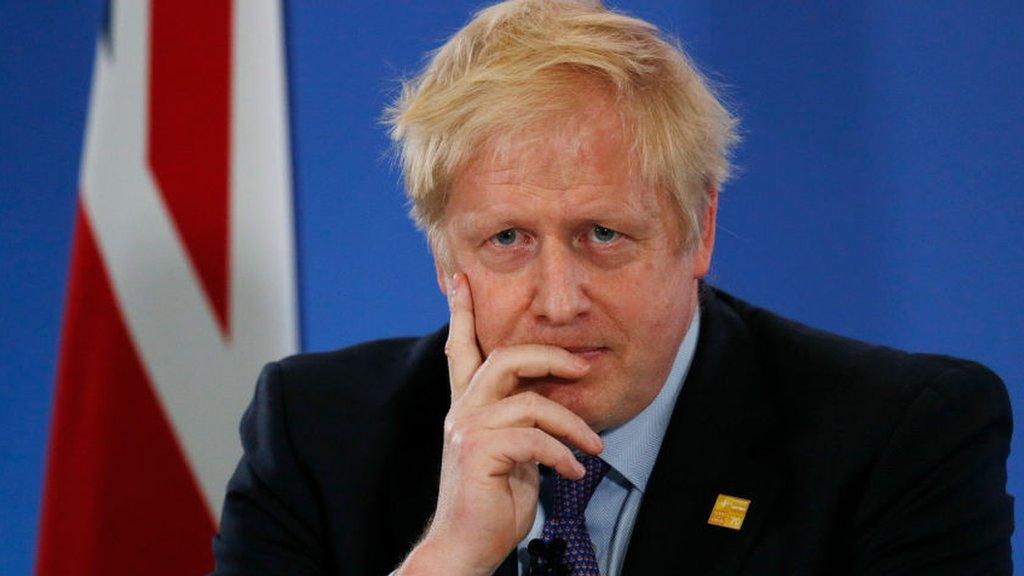What's happening in Parliament this week?
- Published

Will the PM be able to keep his backbenchers in check?
It can't be called a rebel alliance, because it wasn't any kind of alliance.
But the question of how the 148 Conservative MPs who voted against Boris Johnson on Monday behave in future is now central to the government's prospects.
Any government "should quail at that number", former Downing Street director of legislative affairs Nikki Da Costa told me on Radio 4's Today in Parliament.
But, from the point of view of the government, the saving grace is that the 148 are a pretty varied bunch. They include Brexiteers and Remainers, and more than 50 shades of Conservative ideology.
So, apart from the future of the prime minister, it is hard to see issues behind which all of them would mobilise to defy the government, or, indeed, a backbench leader capable of mobilising them all.
But at the same time many of the 148 sense that they have the chance to exert considerable leverage over a weakened leadership - especially when a rebellion of 40 Conservatives (or a bout of mass abstention) would be enough to cancel out the government's normally imposing majority.
Political capital
In short, the numbers are there to allow different individuals and alliances to push for changes to policy and in particular vote through changes to legislation when bills reach Report Stage in the Commons.
So whether it's former Lord Chancellor Sir Robert Buckland pushing an amendment to the National Security Bill to bring in a public interest defence for leaking official secrets, or a host of backbenchers seeking to rewrite the planning proposals in the Levelling Up Bill, the government can expect endless pecking at its legislation from its own supporters, from all kinds of ideological directions.
That means ministers will constantly have to spend political capital heading off rebellions or conceding to them. With the Northern Ireland Protocol Bill due to be presented on Monday, they will want to keep that in mind.
Monday sees MPs considering detailed amendments to the Higher Education (Freedom of Speech) Bill, which seeks to ensure that universities do not cancel unpopular opinions. There are a number of interesting backbench amendments, including a new clause from former ministers Jesse Norman and Robert Halfon, which would create a new duty on higher education institutions to disclose overseas gifts and contracts which might have an impact on freedom of speech,
Sir John Hayes and Tom Hunt, chair and vice-chair of the Common Sense Group of Conservative MPs, have an amendment on harassment of students or academic staff. So there's an early chance to see how the government will react to amendments from its backbenchers.
In Westminster Hall there's a debate on e-petition 613556 - "Ensure trans people are fully protected under any conversion therapy ban" - which attracted 145,715 signatures.
Tuesday's main debate will be on a Labour Opposition Day motion or motions - not yet announced. But keep an eye on Conservative Anthony Mangnall's Westminster Hall debate on inshore fisheries (Tuesday 09:30) - where he will call for the streamlining of new regulation which have imposed increased costs for small-scale fishermen, as well as safety concerns.
On Wednesday there's the Second Reading of an interesting post-Brexit bill - the Genetic Technology (Precision Breeding) Bill - which will remove what ministers say are unnecessary barriers to research into new gene-editing technology. This could lead to plant varieties and animals with beneficial traits requiring fewer pesticides and fertilisers, for example.
In Westminster Hall, Labour's Tanmanjeet Singh Dhesi leads a debate on fire-and-rehire tactics (14:30), which could well be the subject of one of the new set of private members' bills (see below).
Bills ballot
Back in the chamber there's a short ceremony as the 20 winners of the annual private members' bills ballot line up to present their chosen bills in the House. At this stage they don't need a finalised text, just a title setting out what their aim is, and the first Friday sittings to debate their chosen measures will be held on 15 July.
There are some interesting offerings in prospect, with some MPs still mulling over their choice at this late stage. But former Health Secretary Matt Hancock, who placed quite low down the batting order, has a bill to bring in compulsory dyslexia screening for primary school children in England.
He says his own dyslexia was not picked up until he reached university, and he believes universal screening will transform the life chances of many children.
Pre-pandemic, the pecking order for the next set of bills, behind those prioritised by the ballot, was decided - slightly bizarrely - by a kind of sleepover at the Public Bill Office (a not very comfortable room in a corridor above the Commons Chamber), where MPs would camp out to be first in the queue to put down presentation bills and ten-minute rule bills.
Covid-19 put paid to that, and now MPs must email in notice of a single proposed bill between 10:00 and 10:30. They can send in more bills later, but these are unlikely to have much priority. But every now and then one of the bills thus put onto the order paper does actually get debated.
Thursday sees a backbench debate marking the fifth Anniversary of the Grenfell Tower fire, led by Labour's Richard Burgon. That's followed by Conservative Nickie Aiken leading a debate on the abuse of the short-term letting and sharing economy - the issue of residents bedevilled by loud parties and antisocial behaviour in neighbouring properties which are constantly rented out.
In Westminster Hall watch out for former cabinet minister Andrea Leadsom's debate on infant mental health (15:00) - she has been campaigning on child health issues ever since her election in 2010.
And in the Upper House?
It looks like a fairly quiet week in the Lords, with peers devoting Monday and Wednesday to detailed probing of the Schools Bill (although any votes will come at a later stage of consideration).
There is, however, a warning sign for ministers, after peers notched up their first defeat of the government in the new parliamentary session, in a (not very consequential) vote on a "regret motion" on an Immigration (Restrictions on Employment and Residential Accommodation) regulation
It has no practical effect, other than to allow peers to say "We told you so" later. But given that the government was defeated 114 times in the previous parliamentary session, it may portend trouble ahead.
And there may well be some entertainment to be had on Thursday's debate on the "case for both House of Parliament to be co-located in the same city" - a counterpunch to Levelling Up Secretary Michael Gove's enthusiasm for relocating noble lords to Stoke-on-Trent.
Conservative constitutionalist Lord Norton will take up the knuckledusters, doubtless with plenty of support from irate peers of all parties, and can expect a fairly deferential reply from whichever government spokesperson draws the short straw.
Committees
Committee Corridor highlights include an appearance by the Prime Minister's adviser on the ministerial code, Lord Geidt, before Public Administration and Constitutional Affairs (Tuesday 10:00).
Fresh from calling for the PM to deliver a public explanation for his law-breaking over lockdown parties, Lord Geidt could prove ("cough") a very interesting witness.
Levelling Up, Housing and Communities questions secretary of state Michael Gove on the Government's Levelling Up plans.
Housing Minister Stuart Andrew will field questions on the government's housing plans - and, doubtless, the sensitive issue of targets for new housing imposed on local councils. (Monday 16:00)
Northern Ireland Affairs will hear the views of veterans and serving and former police officers on the Northern Ireland Troubles (Legacy and Reconciliation) Bill, and its proposals to investigate Troubles-related deaths, which include giving immunity from prosecution to those involved in Troubles-related incidents on the condition of full cooperation (09:30 Wednesday).
Related topics
- Published10 May 2022

- Published7 June 2022

